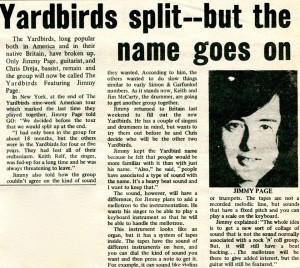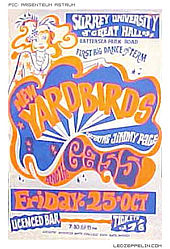I’m not at the Rock and Roll Hall of Fame Library and Archives to research the Yardbirds, but they’re one of those groups that I try to gather as much material on as possible no matter what the channel. So it is that last week I stumbled across a couple of items I’d never seen before, though I’ve tried to find out as much as I can about them for 35 years or so.
For instance, the December 1969 issue of ZigZag (the first true UK underground rock paper) has an interview with singer Keith Relf and drummer Jim McCarty that’s new to me. Most of it’s about Renaissance, the group they formed shortly after the Yardbirds split in mid-1968. But here’s an interesting quote about the Yardbirds:
“Jeff Beck virtually took over. If we wanted to do something soft and peaceful, it was very difficult — he wasn’t interested at all. We managed to make “Still I’m Sad,” but I don’t think he was involved in that; I don’t think he was even there when we recorded it.”
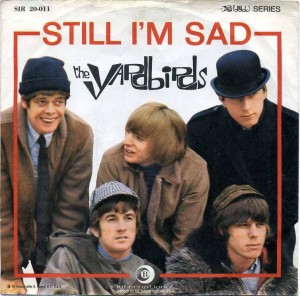
As half of a double-A-side with “Evil Hearted You,” “Still I’m Sad” was a #3 single in the UK in 1965, though it was only a B-side in the US.
(A little annoyingly, the separate responses by Relf and McCarty are not identified in the article. All of them are attributed to “R.”)
I don’t doubt that Beck was less into “soft and peaceful” sounds than Relf and McCarty. Part of the reason those two guys left the Yardbirds, after all, was that they wanted to do soft folk-rockish stuff with harmonies, a la some of the Turtles’ and Simon & Garfunkel’s output (as you can hear on the few tracks they cut as a duo, under the name Together).
Nonetheless, the guitar solo on “Still I’m Sad” absolutely sounds like Beck to me. It has that great snaky, almost Asian-Middle Eastern sound typical of much of his Yardbirds work, with the swelling and ebbing sustain that was also characteristic of a lot his mid-‘60s playing. If it wasn’t Beck, who was it? Chris Dreja, then their rhythm guitarist? A top session guitarist like Big Jim Sullivan, or even a pre-Yardbirds Jimmy Page?
Maybe Beck indeed didn’t like the song, though it was a classic groundbreaking work that was one of the first rock hits (in the UK it was, at any rate) to draw upon serious non-romantic introspective lyrical themes and exotic world music elements, including Gregorian chant-like backing vocals. But I doubt he wasn’t on the session, even if he didn’t participate in the chanting (though it’s been verified colorful Yardbirds manager/co-producer Giorgio Gomelsky did).
Before leaving Jeff Beck for his successor, another thing I happened upon was an Epic Records press release for the Yardbirds from July 1965 — possibly the first one issued on their behalf in the US. “One of the atomic-like forces produced by England’s musical invasion of America, and a force destined to leave a permanent mark, is a group which calls itself the Yardbirds,” it begins, and if it was probably written in the spirit of overhype, it turned out to be absolutely correct.
Incorrect is the claim that their debut single “I Wish You Would”/“A Certain Girl” made the Top Ten in England; actually, it didn’t make the UK charts at all. Not exactly false, but weirdly worded, is the claim that Jeff Beck “plays the lead guitar and violin as well as the electric saw. Besides his obvious physical attributes and a look of ‘innocence,’ Jeff can boast an ability to simulate wacky, offbeat sounds on the guitar.”
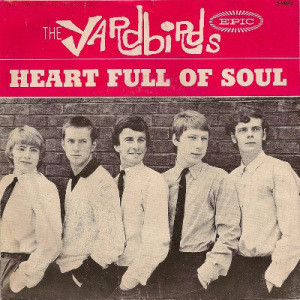
Epic was about to push the “Heart Full of Soul” single when it issued their 1965 Yardbirds press release, perhaps not realizing that the US sleeve pictured the Eric Clapton lineup, not the Jeff Beck one that played on the tracks.
The other item was from the June 29, 1968 issue of Cash Box, announcing the Yardbirds were splitting. Cash Box was the second-biggest music trade magazine of the time (Billboard was the biggest), although it, unlike Billboard, is damnably hard to find in public libraries:
Lead guitarist Jimmy Page and bassist Chris Dreja [who’d switched to bass from rhythm guitar a little after Page joined in mid-1966] will continue using the Yardbirds name, although billing will include a “featuring Jimmy Page” tag when the Yardbirds return to the States in October for a series of college concerts. Page returned to London Thursday June 13 to start auditioning for a new drummer and vocalist. He also plans to incorporate a mellotron into the new act. This will be played by the vocalist. “No one has ever toured with one before; it’s a very delicate instrument,” Page stated.
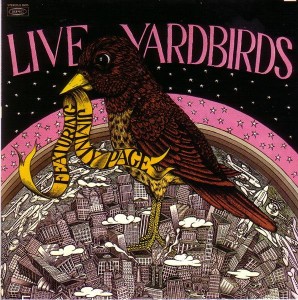
The Yardbirds never would come back to the US to tour under the billing “featuring Jimmy Page.” But oddly enough, this live LP of a March 30, 1968 concert in New York was issued with the “featuring Jimmy Page” billing in 1971. It was quickly withdrawn from the market, though it’s since been frequently bootlegged.
It’s not so surprising the band would have been themselves as the Yardbirds “featuring Jimmy Page” had they continued (they didn’t) or returned to the US in October (they didn’t do that either, obviously). Page wasn’t all that famous when the Yardbirds broke up, as all of their big hits predated his promotion to lead guitarist in late 1966 (though he did play dual lead with Beck for a few months before that, most notably on the classic single “Happenings Ten Years Time Ago”). But he was the most famous of the four guys in their final lineup, with the possible exception of Relf, and already pretty well known to devoted rock fans for his guitar brilliance, if more so live than on the generally disappointing records they cut after Beck’s departure.
No, what’s strange about this bulletin is Page’s apparent plan to hire a combination singer/mellotronist. The mellotron itself was a new and very expensive instrument in mid-1968; not many rock musicians had one or knew how to play it. I can think of very few who could have both sung and played the instrument onstage, and just carting the thing around on tour those days was difficult and rare, if it was being done at all. Graham Bond, Rod Argent of the Zombies, and Mike Pinder of the Moody Blues (who wasn’t one of their primary singers, but did take some lead vocals) could have done it, most likely, though none seem like a particularly good fit for the post-Yardbirds/pre-Led Zeppelin combo Page had in mind.
Can you imagine singers showing up for auditions, only to be told that they’d need to play a mellotron too? It would certainly seem to limit the pool of available choices. But this couldn’t have been an erroneous report, or a joke by Page taken seriously, as a very similar, fuller account appeared around the same time in the June 21, 1968 issue of Go magazine:
As the article states, “Jimmy plans to add a mellotron to the instrumentation. He wants his singer to be able to play a keyboard instrument so that he will be able to handle the mellotron.” As he explains in the piece:
The whole idea is to get a new sort of collage of sound that is not the sound normally associated with a rock’n’roll group. But it will still have a beat backing…The mellotron will be there to give added interest, but the guitar will still be featured.
How would it have sounded? We don’t know, because the Yardbirds didn’t continue under that name with a revised lineup, though they briefly traded under the “New Yardbirds” name. Instead, they evolved into Led Zeppelin. Dreja dropped out, John Paul Jones stepped in, the new drummer was John Bonham, and the new singer was Robert Plant, who didn’t play the mellotron.
It’s too bad, though, that there weren’t rehearsal tapes or something like that exploring Page’s idea. It sounds kind of cool, and in keeping with the Yardbirds’ generally fearlessly experimental bent throughout their career.
